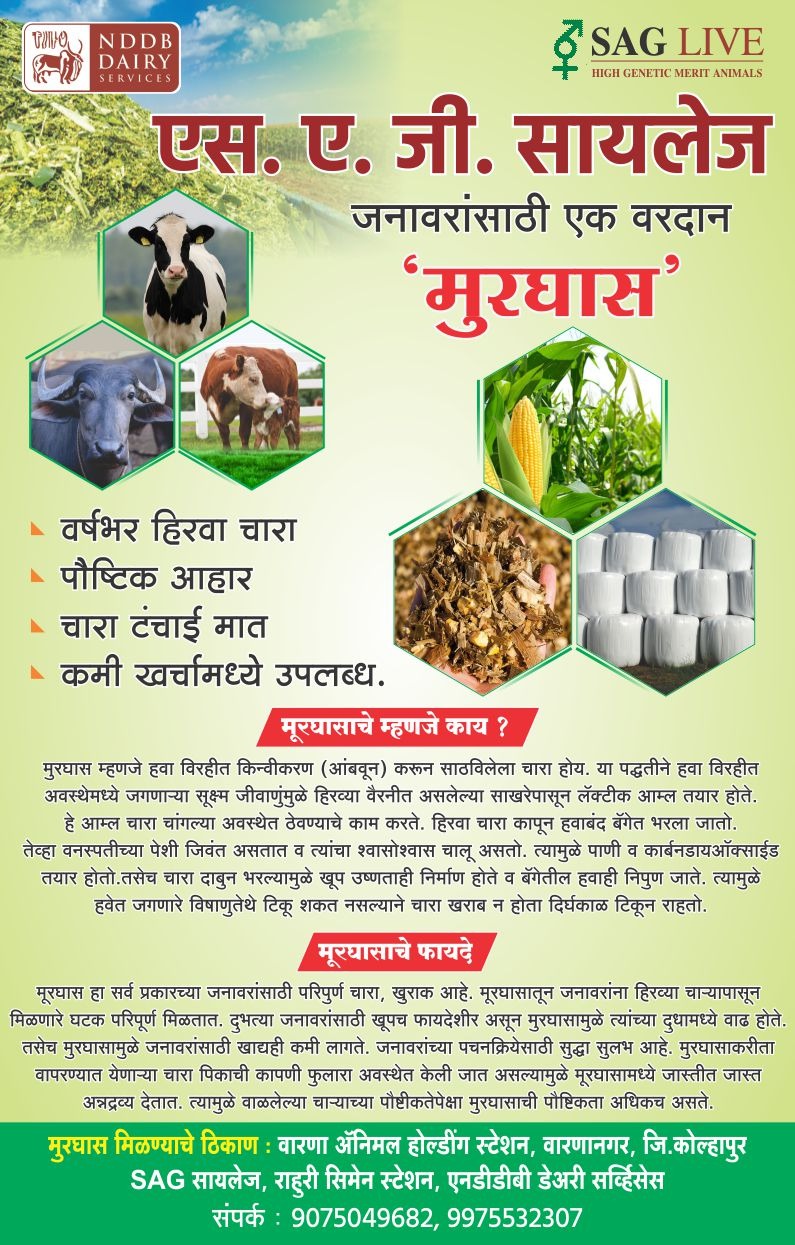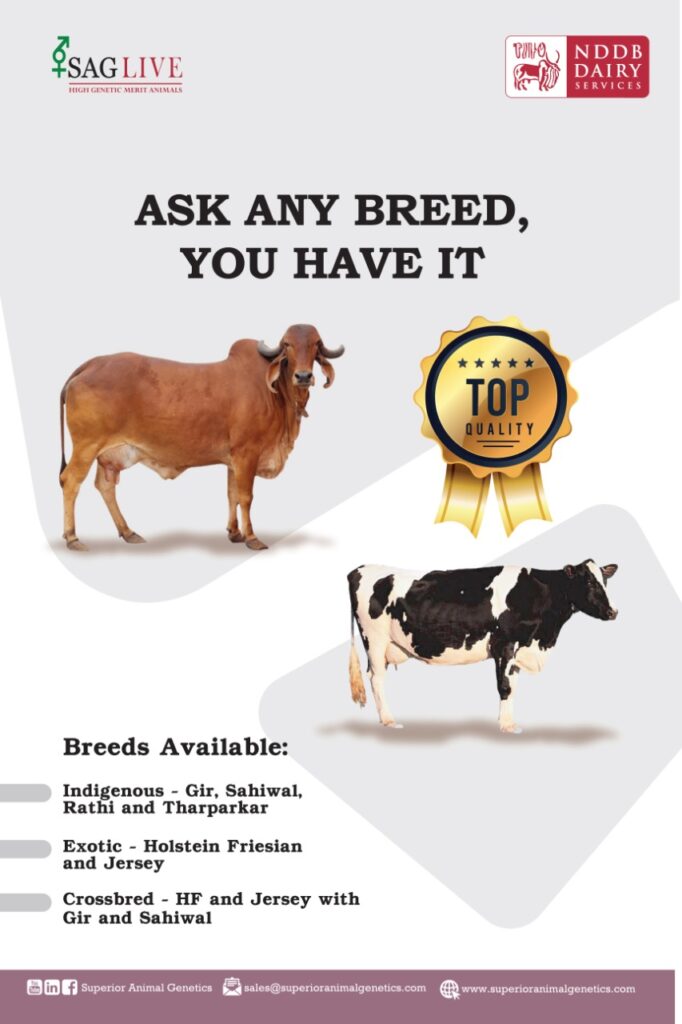Our key operations include Semen production, Embryo production, Fodder production, Animal sales and Training. All these activities are targeted to achieve the organization’s objective.
- Semen production
- Embryo Transfer Technology
- Fodder Production
- Animal Sales
- Training
- Other Activities
Semen Production
Our core operation is Frozen Semen production & Sales, where we provide high genetic merit bulls’ frozen semen. HGM bulls of cattle breeds-Holstein Friesian, Jersey, HF & JY Crossbreds, Amritmahal, Gir, Hallikar, Haryana, Kangayam, Kankarej, Khillar, Ongole, Ponganur, Rathi, Red Sindhi, Sahiwal, Tharparkar, Vechur, as well as buffalo breeds- Jaffarabadi, Murrah, Pandharpuri, are available at our station.
Since its inception, we have made significant progress and a variety of reproductive technologies have become commonplace, with notable effects. Superior gains with frozen semen are accomplished by keeping high genetic merit bulls at the semen stations and providing quality AI semen doses. There is a greater breadth of surveillance for health, biosecurity, resource efficiency, and production maximization.
As a professionally managed semen station that closely complies with the Minimum Standards Protocols (MSP), we have necessary bio-security procedures in place to produce disease-free semen, which is the foundation of any genetic enhancement program. As a result, we manufacture quality frozen semen to assure improved fertility and faster genetic advancement.
Artificial insemination has long been utilized as a strategy for quick genetic improvement of the country’s cow stock. In the current context, where the country is working to close the demand-supply gap for milk, expanded use of AI is critical to improving the productivity of dairy animals in the country. NDDB Dairy Services Semen Stations have played an important role in steering our country to evolve as the top milk-producing nation in the world.
Breeding operations in the country are constrained by operational restrictions, therefore semen production stations must equip themselves with the technology to analyze and process semen so that there is little deterioration in its intrinsic fertility. The cost of producing a high-quality product includes both financial and human resources. As a result, the time has come to create more efficient and effective structures that focus on providing value to the product while minimizing expenses.
Given the foregoing, our semen production facility attempts to establish and constantly revalidate semen collecting and processing processes that use acceptable viability parameters that are compatible with guidelines. Furthermore, our in-house quality audit and successful application of quality management systems contribute to continuous product and service improvement, resulting in increased customer satisfaction. This guarantees that a high-quality product is continually developed and supplied via careful planning and execution.

Embryo Transfer Technology
Embryo transfer is a technique by which embryos are collected from a donor female and are transferred to recipient females, which serve as surrogate mothers for the remainder of the pregnancy. The donor is a genetically superior female (cattle and buffalo) and the recipient female may not be genetically superior.
There are two methods of producing embryos; one is in-vivo (within the body) and another is the in-vitro (outside the body) production of embryos.
Embryo transfer technology (ETT) is available with doorstep service. Choose your next-generation ET-born cows from a selection of donors and sires of your choice.
Breeds Available:
- Sahiwal,
- Gir,
- Rathi,
- Tharparkar,
- Red Sindhi and more.
- Exotic and Crossbred breed cows.
Features:
- ET pregnant heifers with Sexed embryos of any breed, produced and Certified
by our Semen Station at an affordable price - Authentic Pedigree records of donor and sire as set by the Government of India
- The shortest path to genetic progress on economic efficiency in large and small
farms.


More than 70% of the Indian population lives in rural regions, and animals are essential for subsistence farming and long-term survival. Climate, topography, physiography, altitude, and other variables have altered the distribution of diverse crop and grass species, which influence both qualitative and quantitative fodder and forage output.
To fulfil demand during the lean season, fodder crops are conserved as silage and hay. An animal production system’s economics and viability are heavily reliant on its fodder production programs. Despite the obstacles given by severe climate, soil, and water salinity, improved resource management and agricultural mechanization have resulted in an increase in fodder output.
Almost all of the processes at our farm are mechanized, including ploughing, seedbed preparation, fertilizer broadcasting, inter-cultivation, harvesting, and cutting of green fodder. In contrast, watering of fodder crops is done with sprinklers and rain guns, which helps to save water.

Animal Sales
With SAG Live, farmers will be able to get superior quality true to the breed female animals. Farmers can choose animal as per their requirement in terms of milk production and management practices. These certified disease-free females which can further be improved by use of “SAG” Branded Frozen Semen Doses. This will result in better yield, faster genetic improvement, and economic upliftment of millions of farmers of our country. Farmers will have the option to choose animals from all major breeds of our country such as Gir, Sahiwal, Rathi, Tharparkar, HF, Jersey as well as HF and Jersey crossbred with Gir and Sahiwal. Through SAG Live, we are truly committed to improve the socioeconomic condition of dairy farmers at the most grassroots level.

Training
Over the last several decades, India’s livestock industry has emerged as an engine of agricultural expansion, fueled by technical progress and supported by infrastructure and institutions, resulting in improved nutritional security and a reduction in rural poverty. Having stated that, good output and reproduction are two crucial components for making dairy farming/business lucrative.
A variety of innovative reproductive technologies have been adopted to improve dairy cow reproductive performance. One of the most significant reproductive technologies used by the dairy sector is artificial insemination. Artificial insemination (AI) is highly important in a country like India, where the supply of quality males (sires) is insufficient and has become a serious impediment to the growth of dairy animals.
Artificial insemination (AI), as the name implies, is a procedure the bovine frozen semen is manually inseminated into the female reproductive canal. AI has become one of the economic tools for genetic improvement of farm animals since sperm from genetically better sires/males are utilized to artificially inseminate female animals. AI is a weapon with the potential for inexpensive and quick transmission of top genetics to a large number of females over a vast geographical region in a short period of time.
We hold regular AI refresher training to uplift unemployed youth and to cater doorstep AI for the farmers.
To take advantage of the breeding infrastructure established under the NDP I and RGM Schemes, we are concentrating our efforts on boosting AI coverage. AI provided to farmers’ doorsteps in accordance with Standard Operating Procedures (SOPs) is critical to scientific animal breeding activities.

| Course Name | Minimum Qualification | Duration (Days) | No of Participants | Venue | Remarks |
|---|
Sales of AI Consumables:
We offer a full range of AI consumables in the form of high-quality standard AI guns, sheaths, forceps, straw cutters, and other spares for accurate and scientific insemination processes. We can supply a complete line of high-quality A.I. equipment and supplies across the length and breadth of the country. Distributors and individuals both can place orders by contacting us at info@rahurisemenstation.com or please contact 8956216137/ 9146039370/
9146029370 / 9075049671.
Ethno Veterinary Medicine Practices (EVM):
EVM is a holistic practice that involves local people’s knowledge, skills, methods, sociocultural structures, and environment associated with practices and beliefs about the care of their animal’s healthcare and husbandry. EVM is generally cost-effective, environment-friendly, and sustainable for a specific area. The knowledge is acquired through practical experience and has traditionally been passed down orally from generation to generation. We at Alamadhi Semen Station are not only putting this traditional knowledge to practice but also taking up the social responsibility to preserve, propagate and integrate this ancient traditional way of life into our daily activities.
Vermicomposting:
A sustainable solution to improve soil quality and reduce input cost. Soils should be alive and home to millions of beneficial bacteria and other microorganisms to make them healthy and for crops to yield well. Agriculture based on indiscriminate use of chemical fertilizers will gradually degrade the soil quality ultimately impacting the crop yield output. Vermicomposting produces fertilizer and soil conditioner which has a high porosity, water-holding capacity, and nutrient status. It has great potential as organic fertilizer with effectiveness like fertilizers. This process also generates high biomass of manure worms, which can also add up, to the financial value. We understand the necessity to reduce the burden of organic agricultural waste management and thus adopted vermicomposting as a means for a faster system for breaking down organic waste than traditional composting approaches, allowing effective management of large organic waste burdens.
Biogas Production:
Our commitment to “Climate and Clean Air Solution”. Biogas is a fully renewable and environmentally friendly fuel that can help to reduce life-cycle greenhouse gas emissions by up to 90% compared with fossil fuel use. We can use Biogas for many purposes as transportation fuel, natural gas, and also as energy for several industries. On our way to be the country’s “First Carbon Footprint Free Semen Station,” we have installed an 80 MT unit for biogas production as a means to boost our “Circular Economy”. This Biogas Unit has made our semen station completely self-sufficient in terms of “Clean Energy Production” by cutting down methane
emissions and producing renewable energy, making it a smart and valuable climate and clean air energy solution.

